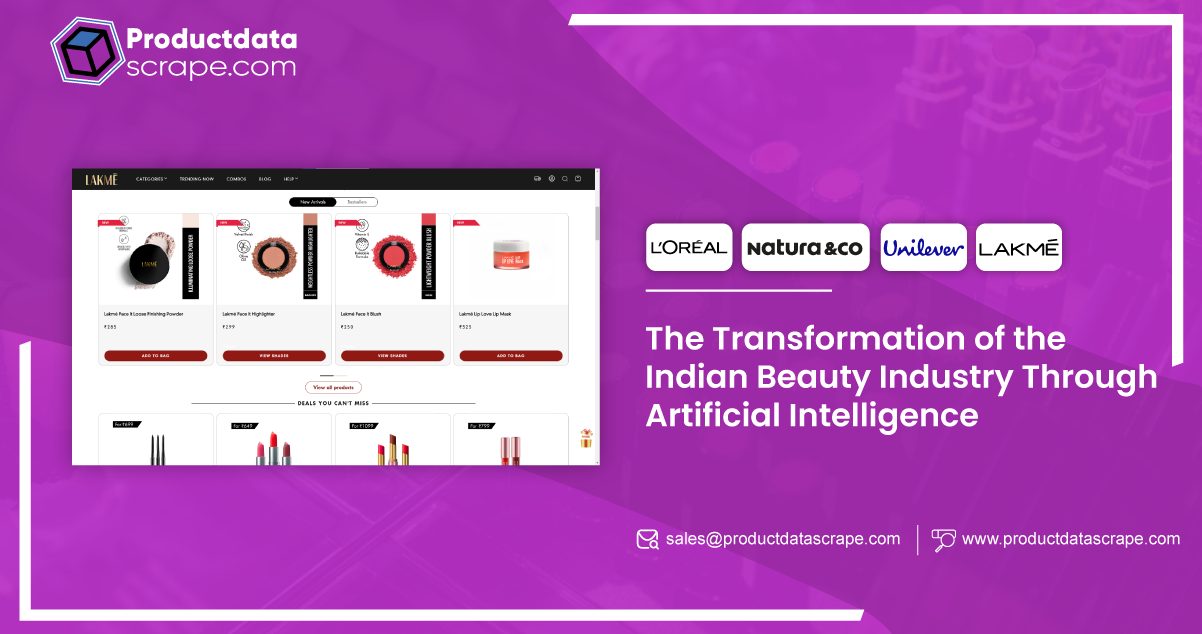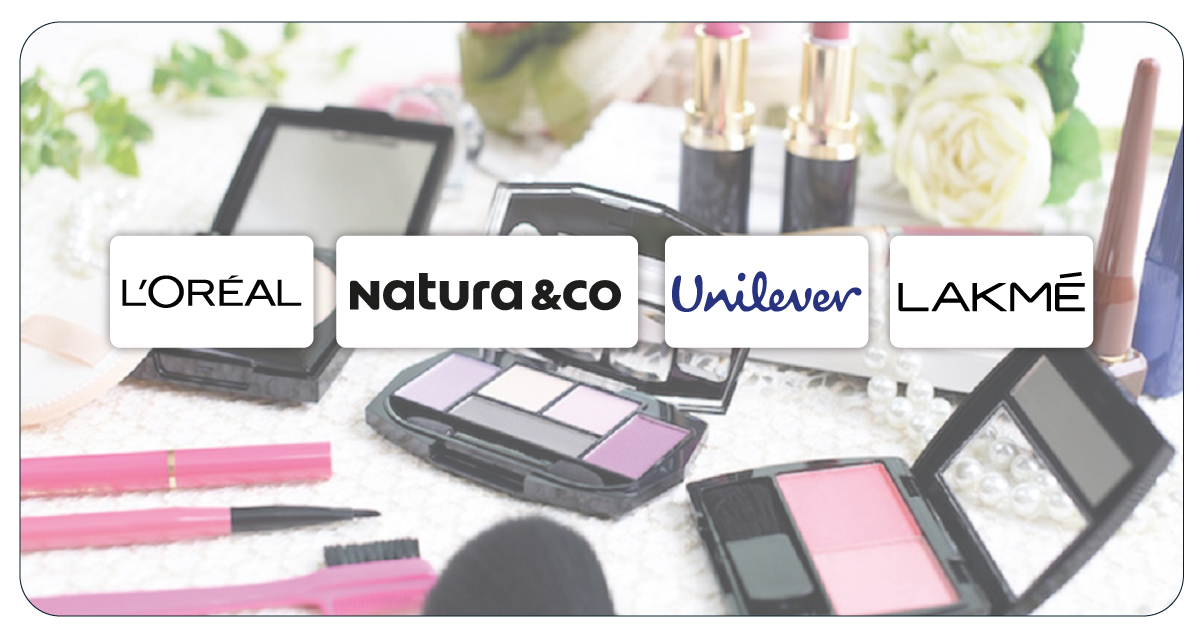
![]()
Introduction:Exploring innovative realms, beauty and cosmetics firms are embracing the potential of artificial intelligence and machine learning. Projections from an Avendus report anticipate the global beauty and personal care market to reach an impressive US$780 billion by 2025, with the burgeoning Indian market poised to ascend to $26 billion within the same timeframe. This sector is a fertile ground for opportunities, housing over 75 thriving Indian brands. The intersection of cutting-edge technology and the beauty industry's dynamics signifies a promising trajectory, underlining substantial prospects for growth and ingenuity in the forthcoming years. The evolution of this segment is not merely a trend but a testament to the transformative power of technology in the beauty landscape.
AI's Beauty Revolution: Transforming Every Facet

Technology is pivotal in the beauty industry, and Artificial Intelligence (AI) is the catalyst for reshaping the landscape. AI's impact is profound across the beauty value chain, from research and development to supply chain management, product selection, and marketing.
Digital-First Precision in Inventory Management
Chaitanya Nallan, CEO and co-founder of SkinKraft Laboratories emphasizes AI's role in maintaining real-time inventory across diverse e-commerce platforms. An in-house data tracking dashboard powered by AI ensures accurate inventory estimates, preventing stock-outs, and informs strategic sales planning.
Unveiling Real-Time Inventory Insights
For brands seeking a competitive edge, AI-driven solutions like Product Data Scrape offer near-real-time inventory tracking, a crucial element in driving sales and maintaining optimal stock availability.
AI's Future Impact on D2C Beauty Brands
As a transformative force, AI steers the future of Direct-to-Consumer (D2C) beauty brands in India. From operational efficiency to strategic marketing insights, the amalgamation of AI and beauty promises a dynamic and innovative journey in this evolving industry.
Bringing Virtual Product Trials to Life

In the contemporary landscape, Augmented Reality (AR) has become a household term, widely integrated into everyday applications. Notably, platforms like Snapchat and Instagram showcase the ubiquity of AR through interactive filters. Extending this concept, beauty brands are at the forefront of a technological revolution, introducing AR-powered 'virtual mirrors' that revolutionize the cosmetic try-on experience in real time.
Modiface by L'Oréal, a pioneer in AR-powered makeup trials, is a prominent exemplar of this innovation. The essence lies in utilizing AI algorithms, where cameras detect facial features through focal points and dynamically map them in real time. Through the sophisticated integration of AR, makeup images are precisely adjusted and seamlessly overlaid onto the user's face. This transformative process provides consumers a virtual preview, allowing them to envision how the cosmetic product would complement their features. The fusion of AI, AR, and beauty exemplified by virtual mirrors epitomizes the future of interactive and personalized consumer experiences in the cosmetics industry.
Recently, the renowned Indian brand Lakme has revolutionized the beauty experience by introducing a 'virtual try-on' feature on its official website. This innovative approach involves the creation of an intelligent mirror, enabling customers to explore different shades virtually, customize them according to their preferences, and witness the transformation in real time. The traditional practice of shade matching, confined to in-store experiences, has undergone a paradigm shift. Previously, customers visiting local cosmetics stores engaged in an on-ground process of selecting and matching shades against their skin tone. Today, leveraging Artificial Intelligence (AI), Lakme's virtual try-on utilizes a virtual shade card, empowering users to narrow down product choices and witness their impact on their skin in real-time. This intersection of technology and beauty marks a significant evolution, granting consumers unprecedented control and personalization of cosmetic choices.
Elevating Personalization
By recognizing the uniqueness of each customer, the one-size-fits-all approach no longer suffices. Individualized beauty routines are the norm, and understanding this concept is a pivotal factor for success in the beauty industry. The future of beauty is intricately tied to the utilization of AI and AR solutions, revolutionizing the beauty shopping experience to cater to the distinct needs of every consumer. It amplifies digital engagement and instills confidence in purchases, empowering brands to enhance conversion rates and foster lasting brand loyalty.
In the pre-pandemic era, offline beauty advisors were crucial in guiding customers through purchase decisions. However, the landscape has transformed, exemplified by Olay's innovative approach. Introducing the "Skin Advisor" app, Olay utilizes a deep-learning algorithm that analyzes a consumer's skin through a simple selfie. With valuable insights into their skin type, customers can now make well-informed and personalized purchases tailored to their specific skincare needs. This intersection of technology and beauty exemplifies a progressive shift towards online personalization, ensuring that the future of beauty is as unique as each customer.
Unlocking the power of customer preferences and leveraging data from their previous purchases is a cornerstone of effective personalized marketing. Dhruv Madhok, Co-Founder of ARATA, emphasizes the transformative impact of data-driven personalization on understanding customer interests. By seamlessly integrating this data into marketing campaigns, brands gain invaluable insights, enabling the delivery of specific, personalized, and relevant content. This targeted approach ensures that the right audience is reached with tailored messaging, fostering increased engagement and customer retention.
The amalgamation of customer data allows for strategic initiatives such as repeat sales through upselling and cross-selling. Beyond basic demographics, understanding customers on a deeper level aids in refining targeting strategies and predicting future behavior. Scrape retail data for analyzing customer interactions through advertisement clicks, social media engagement, or email list subscriptions provides a comprehensive view of customer interests. This holistic approach, combining analytics and demographics, enhances marketing effectiveness and empowers brands to anticipate and cater to their customers' evolving preferences and behaviors.
Elevating Product Development Through Enhanced Customer Understanding
Utilizing AI algorithms to delve into and analyze customer feedback has become an instrumental practice. These algorithms are adept at interpreting customer comments, reviews, and feedback across a brand's digital landscape, encompassing websites, social media channels, and various online platforms. Moreover, Artificial Intelligence extends its analytical capabilities to decode and assess responses from questionnaires and feedback forms, whether submitted online or offline.
In the beauty and personal care industry, where user experience and preferences play a pivotal role, understanding customer sentiments towards essential products becomes a strategic advantage. This insight not only aids businesses in creating products aligned with customer preferences but also enhances the likelihood of successful market reception. A compelling example comes from the renowned beauty brand Avon, which recently unveiled its True 5-in-1 Lash Genius Mascara, a product directly inspired by actual consumer feedback.
Avon employed machine learning and artificial intelligence to sift through, process, and rank thousands of online consumer comments. This comprehensive analysis allowed them to discern the top features consumers desired in mascara. Armed with this valuable customer intelligence, Avon successfully developed a unique product that directly addressed the preferences and demands voiced by consumers. This real-world application underscores the transformative potential of AI in shaping product development strategies based on authentic customer insights.
In the quest to understand consumer sentiments online, the company offers an AI-powered sentiment Analysis solution using e-commerce data scraping , empowering brands to listen effectively to customer feedback. This approach has become increasingly integral as brands harness insights from customer responses to innovate, introduce new products, and refine existing offerings. Chaitanya from SkinKraft Laboratories emphasizes the role of the Online Reputation Management (ORM) team's role, which responds to customer queries and plays a crucial role in extracting critical insights from observed user behavior.
Bombay Shaving Company exemplifies the significance of a data-centric culture in leveraging customer responses for decision-making and product development. Shantanu Deshpande, Founder & CEO, highlights how data analytics facilitated the exploration of in-home experience-driven needs during the pandemic, successfully introducing a women's brand with innovative hair removal products.
Conclusion
In the beauty and personal care industry, where usage patterns profoundly influence trends, Artificial Intelligence emerges as a transformative force. Beyond virtual trials and personalization, AI is crucial in monitoring a Digital Shelf of brand with the help of price intelligence . Brands can enhance online sales by tracking key Digital Shelf KPIs such as product visibility, share of search, pricing and discounting, product content, availability, and assortment. With the diverse potential of AI, the beauty industry stands at the brink of a paradigm shift, unlocking new dimensions of customer engagement and market success.
At Product Data Scrape, ethical standards underpin all our operations, from Competitor Price Monitoring Services to Mobile app data Scraping. Our global presence guarantees exceptional and transparent services for diverse client needs.



































.webp)






